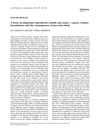 10 citations,
April 2018 in “Maturitas”
10 citations,
April 2018 in “Maturitas” Excess male hormones in postmenopausal women can cause health issues and increase the risk of heart disease and diabetes; treatment depends on the cause.
1 citations,
January 2024 in “Journal of personalized medicine” Hormonal imbalances during menopause may significantly contribute to Frontal Fibrosing Alopecia.
 February 2010 in “Acta Obstetricia et Gynecologica Scandinavica”
February 2010 in “Acta Obstetricia et Gynecologica Scandinavica” The issue covers reproductive health topics like cancer markers, incontinence treatments, and the impact of pre-term birth.
 85 citations,
April 2004 in “Thyroid”
85 citations,
April 2004 in “Thyroid” Thyroid problems can negatively affect women's reproductive health and pregnancy, and can cause symptoms like fatigue and depression, but not all women with these symptoms need treatment.
 June 2024 in “Georgetown medical review”
June 2024 in “Georgetown medical review” Finasteride treats hair loss but may cause low libido, erectile issues, and depression.
 May 2023 in “Frontiers in Endocrinology”
May 2023 in “Frontiers in Endocrinology” Blocking CRF1 receptors improved male hormone levels and reduced testicular tumor size in men with a specific adrenal condition.
 September 2016 in “Princeton University Press eBooks”
September 2016 in “Princeton University Press eBooks” The document concludes that understanding health requires considering evolutionary perspectives on reproductive fitness, and recognizing the complexity of factors like diet, testosterone, and sexual orientation.
 October 2023 in “Toxicology and Applied Pharmacology”
October 2023 in “Toxicology and Applied Pharmacology” Finasteride is more harmful to male reproductive health than minoxidil.
 February 2023 in “Vaccines”
February 2023 in “Vaccines” COVID-19 may harm male reproductive health and lower testosterone levels, potentially affecting fertility and causing erectile dysfunction. More research is needed.
 November 2020 in “Ukraïnsʹkij žurnal sučasnih problem toksikologìï”
November 2020 in “Ukraïnsʹkij žurnal sučasnih problem toksikologìï” Minoxidil lotion may harm male reproductive health.
19 citations,
June 2021 in “The world journal of men's health” Using anabolic-androgenic steroids can harm men's reproductive health and increase the risk of heart problems and death.
 40 citations,
September 2019 in “Molecular and Cellular Endocrinology”
40 citations,
September 2019 in “Molecular and Cellular Endocrinology” Group a wide range of chemicals, not just phthalates, for assessing risks to male reproductive health.
 4 citations,
October 2022 in “Evidence-based complementary and alternative medicine”
4 citations,
October 2022 in “Evidence-based complementary and alternative medicine” Ficus carica extract improved fertility in rats and may help with certain health conditions.
September 2021 in “Fertility and sterility” Taking 100 mg of DHEA daily for 16 weeks did not change metabolic and reproductive health significantly but increased certain ovarian markers with minimal side effects.
 25 citations,
May 2021 in “Journal of exposure science & environmental epidemiology/Journal of exposure science and environmental epidemiology”
25 citations,
May 2021 in “Journal of exposure science & environmental epidemiology/Journal of exposure science and environmental epidemiology” Common Black hair care products may affect hormone levels and potentially impact health, especially in reproductive and metabolic areas.
 10 citations,
January 2018 in “Seminars in Reproductive Medicine”
10 citations,
January 2018 in “Seminars in Reproductive Medicine” The document concludes that women with PCOS need a comprehensive care model that covers reproductive, metabolic, and psychological health to improve their quality of life.
 2 citations,
April 2021 in “Reproductive health of woman”
2 citations,
April 2021 in “Reproductive health of woman” Most women with polycystic ovary syndrome (PCOS) have menstrual issues, infertility, acne, and excessive body hair, with the most common type being the non-androgenic phenotype.
1 citations,
November 2023 in “Medicina” Hormone therapy improves mental well-being in transgender individuals but requires ongoing health monitoring.
 47 citations,
January 2021 in “Fertility and Sterility”
47 citations,
January 2021 in “Fertility and Sterility” COVID-19 might affect male fertility, but more research is needed to understand the full impact.
16 citations,
January 2017 in “Asian journal of andrology/Asian Journal of Andrology” Men who start puberty later may have lower sperm quality and different hormone levels in adulthood.
 March 2023 in “Seminars in reproductive medicine”
March 2023 in “Seminars in reproductive medicine” PCOS often leads to sleep problems, especially obstructive sleep apnea, affecting overall health.
 4 citations,
January 2022 in “Open Health”
4 citations,
January 2022 in “Open Health” Eating healthy, exercising, and changing behaviors are the best first steps to treat Polycystic Ovary Syndrome (PCOS).
 74 citations,
July 2010 in “The Journal of Clinical Endocrinology & Metabolism”
74 citations,
July 2010 in “The Journal of Clinical Endocrinology & Metabolism” Treatment of acromegaly can improve women's reproductive health issues caused by hormonal imbalances or tumors.
 January 2023 in “Revista Da Associacao Medica Brasileira”
January 2023 in “Revista Da Associacao Medica Brasileira” The document concludes that women's health needs a holistic approach, considering all life stages, promoting lifestyle changes, regular exercise, proper diet, and vaccinations, with health professionals playing a key role in education and guidance.
 6 citations,
April 2019 in “Russkij žurnal detskoj nevrologii”
6 citations,
April 2019 in “Russkij žurnal detskoj nevrologii” Some epilepsy drugs can cause reproductive and cosmetic side effects in women and affect pregnancy, but most women still have healthy babies.
 3 citations,
September 2022 in “Cureus”
3 citations,
September 2022 in “Cureus” Platelet-rich plasma shows promise for treating various female reproductive health issues but requires more research.
 1 citations,
October 2017 in “Elsevier eBooks”
1 citations,
October 2017 in “Elsevier eBooks” Antiandrogens can treat female hormonal conditions, but environmental ones may harm reproductive health.

Eating healthy, exercising, and certain nutrients like myoinositol and omega-3s can help manage PCOS symptoms.
 November 2017 in “Elsevier eBooks”
November 2017 in “Elsevier eBooks” PCOS is a genetic disorder affecting women's reproductive health, with treatments focused on symptoms like insulin resistance and fertility.
 March 2014 in “Fertility and Sterility”
March 2014 in “Fertility and Sterility” The April 2014 issue of "Fertility and Sterility" discussed various reproductive health topics, including hormone therapy benefits, sperm and genetic factors in male infertility, and the link between PCOS and diabetes.

























